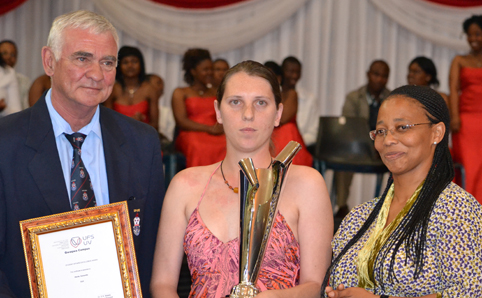 |
|
Samantha Renda-Dollman with Dr Choice Makhetha, the sponsor of the DUX Award trophy and Vice-Rector: External Affairs. Sharing the moment with them is Prof. Willie van Zyl, Assistant Campus Principal: Academic.
Photo: Thabo Kessah
|
Samantha Renda-Dollman, a BSc (Zoology) student at our Qwaqwa Campus has obtained 19 distinctions out of the 22 modules she has written since 2009.
This was revealed during the 2011 Annual Student Affairs Excellence Awards that were held at the Qwaqwa Campus to honour academic, sport and cultural excellence. Her hard work earned Samantha the prestigious Dux student award, which makes her the best overall academic performer of the entire student body at this campus of the UFS. This award was presented to her by its sponsor, Dr Choice Makhetha, Vice-Rector: External Affairs, herself a former Dux student.
Considering her achievements to date, Samantha agrees with the Greek philosopher, Aristotle, who believed that ”we are what we repeatedly do; excellence then is not an act, but a habit.” According to Samantha, one of her biggest achievements was winning a national poetry competition in 2000 whilst she was still at a primary school.
“I am happy to be the 2011 Dux student, as it proves that hard work indeed pays. If you commit yourself to working hard all the time and do lots of studying, then achievements like this will come your way,” she said.
Samantha’s immediate plan is to finish her degree and then venture into studying for an honours degree in entomology. “I would like to do my bit in the academic world. That’s where I think my future lies,” she concluded.
Samantha also received the award for the best-performing second-year student in the Faculty of Agricultural and Natural Sciences.